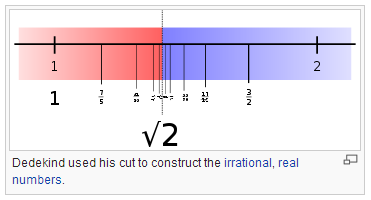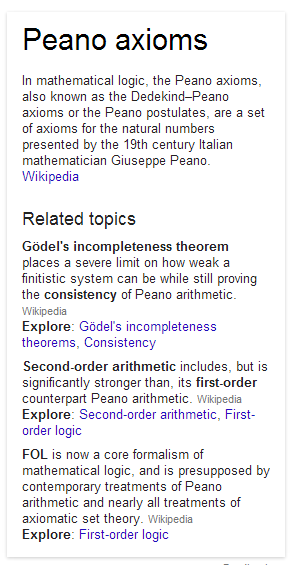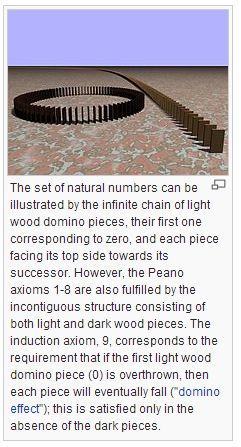From: ontolog-forum-bounces@xxxxxxxxxxxxxxxx [mailto:ontolog-forum-bounces@xxxxxxxxxxxxxxxx]
On Behalf Of Bruce Schuman
Sent: Tuesday, April 22, 2014 5:19 PM
To: '[ontolog-forum] '
Subject: Re: [ontolog-forum] axiom
Wikipedia says more or less the same thing –
http://en.wikipedia.org/wiki/Axiom
“An axiom, or postulate, is a premise or starting point of reasoning. A self-evident principle or one that is accepted as true without proof as the basis for argument;
a postulate. As classically conceived, an axiom is a premise so evident as to be accepted as true without controversy.”
“No explicit view regarding the absolute truth of axioms is ever taken in the context of modern mathematics, as such a thing is considered to be an irrelevant and impossible
contradiction in terms.”
*
In the context of our recent discussion here of “ambiguity” – I suppose my instinct is to doubt anything postulated as an axiom that does not have an absolutely unambiguous
interpretation.
Based on the broader definition of axiom – Richard’s axioms from Ayn Rand meet the criteria. In that context, what an axiom is becomes a stipulative definition. “An axiom
is what I say it is – and if I can get people to go along with me, then we’ll all agree it’s an axiom” – and build our world on this basis – and the question of whether this is realistic or sound – becomes a matter of opinion.
But for me – axioms with multiple alternative interpretations are confusing, and seem likely to lead to more confusions. I sometimes wonder if Dedekind’s program to prove the
consistency of mathematics – generally considered proven impossible by Kurt Goedel – actually ran afoul of something inherently ambiguous in the foundations of arithmetic – the Peano axioms.
This is a heady topic – and I don’t have a clear-cut direction – except to wonder whether it might be possible to remove any possible ambiguity in a structure like “A + B =
B + A” by “constructing” all these elements in a “machine space” that is 100% explicitly known in every dimension.
For me – this issue gets into the kinds of things Richard Hofstadter was talking about years ago in Godel Escher and Bach – and later, in Metamagical Themas.
If the existence of a mathematical object – like “A” – is actually “a label for something” – how is that label constructed, and what is that something, and where is it located,
and how is it possible to execute actual operations on that something?
For years, I was staring at Hermann Weyl’s quote: “Nobody can say what a variable is”.
Well – a lot of people think they know what a variable is – and they are probably right – but how can something change (how can it vary) and still be the same thing? This notion
of identity is mysterious. In a computer, we might say that the variable or label is a box – that does not change over time – while the value “inside it” does change. Maybe this issue of “the box” and “what’s inside it” have something to do with the “figure/ground”
mysteries that Richard Hofstadter was exploring – a kind of primal yin/yang.
All human understanding is constructed on something like this basis. Alphabets come from somewhere, words are constructed from them, and from words come huge complex edifices
– and then huge arguments erupt within those edifices – and the welfare of the entire human race is put at risk.
My instinct has been – to drive the analysis of this structure down to an absolutely immovable (undifferentiable) foundation – probably involving concepts like the “Dedekind
cut” that partitions the real number line and defines the principle of continuity. Conceptual reality comes into the world at the point where (digital/finite-state) concepts parse or intersect with continuous (or undifferentiated) reality and start drawing
arbitrary boundaries selected for human purposes.
So – I would like to see some way that “axioms” could be constructed from a primal basis like this – where every facet of the construction was explicitly identified – and perhaps
reproduced in a machine space – and absolutely mapped into continuity with zero error.
If we really could really get solid on this – we might have some hope of getting past this generally-accepted convention that “even axioms are a matter of philosophic opinion”
– and begin to unfold a true common ground and common foundation for the entire undertaking of civilization…
???
- Bruce



Peano axioms
From Wikipedia, the free encyclopedia
In mathematical logic, the Peano axioms, also known as the Dedekind–Peano
axioms or the Peano postulates, are a set of axioms for the natural numbers presented by the 19th century Italian mathematician Giuseppe
Peano. These axioms have been used nearly unchanged in a number of metamathematical investigations, including research into fundamental questions of consistency and completeness of number
theory.
The need for formalism in arithmetic was not well appreciated until the work of Hermann
Grassmann, who showed in the 1860s that many facts in arithmetic could be derived from more basic facts about the successor operation and induction.[1] In
1881, Charles Sanders Peirce provided an axiomatization of
natural-number arithmetic.[2] In 1888, Richard Dedekindproposed a collection of axioms about
the numbers, and in 1889 Peano published a more precisely formulated version of them as a collection of axioms in his book, The principles of arithmetic presented by a new method (Latin: Arithmetices
principia, nova methodo exposita).
The Peano axioms contain three types of statements. The first axiom asserts the existence of at least one member of the set "number". The next four are general statements
about equality; in modern treatments these are often not taken as part of the Peano axioms, but rather as axioms of the "underlying logic".[3] The
next three axioms are first-order statements about natural numbers expressing the fundamental properties of the successor operation. The ninth, final axiom is a second
orderstatement of the principle of mathematical induction over the natural numbers. A weaker first-order system called Peano arithmetic is obtained
by explicitly adding the addition and multiplication operation symbols and replacing the second-order induction axiom with
a first-order axiom schema.
**
An axiom, or postulate, is a premise or starting point of reasoning. A self-evident principle or one that is accepted as true without proof as the basis for argument;
a postulate. As classically conceived, an axiom is a premise so evident as to be accepted as true without controversy.[1] The
word comes from the Greek ἀξίωμα (āxīoma) 'that which is thought worthy or fit' or 'that which commends itself as evident.'[2][3] As
used in modern logic, an axiom is simply a premise or starting point for reasoning.[4] Axioms define and delimit the realm
of analysis; the relative truth of an axiom is taken for granted within the particular domain of analysis, and serves as a starting point for deducing and inferring other relative truths.
No explicit view regarding the absolute truth of axioms is ever taken in the context of modern mathematics, as such a thing is considered to be an irrelevant and impossible contradiction in terms.
In mathematics, the term axiom is used in two related but distinguishable senses: "logical
axioms" and "non-logical axioms". Logical axioms are usually statements that are taken to be true within the system of logic they define (e.g., (A and B) implies A),
while non-logical axioms (e.g., a + b = b + a) are actually defining properties for the domain of a specific mathematical theory (such as arithmetic). When
used in the latter sense, "axiom," "postulate", and "assumption" may be used interchangeably. In general, a non-logical axiom is not a self-evident truth, but rather a formal logical _expression_ used in deduction to build a mathematical theory. As modern mathematics
admits multiple, equally "true" systems of logic, precisely the same thing must be said for logical axioms - they both define and are specific to the particular system of logic that is being invoked. To axiomatize a system of knowledge is to show that its
claims can be derived from a small, well-understood set of sentences (the axioms). There are typically multiple ways to axiomatize a given mathematical domain.
In both senses, an axiom is any mathematical statement that serves as a starting point from which other statements are logically derived. Within the system they define, axioms
(unless redundant) cannot be derived by principles of deduction, nor are they demonstrable by mathematical proofs, simply because they are starting points; there is nothing
else from which they logically follow otherwise they would be classified as theorems. However, an axiom in one system may be a theorem in another, and vice versa.
Bruce,
The simple definition of ‘axiom’ is “a statement/sentence that you take to be true”, usually without having any ability to prove its truth from other knowledge or assumptions.
There can be many different reasons WHY someone takes a given statement to be true – social agreement, blind faith, preponderance of evidence, hubris, etc. That does not affect the concept ‘axiom’.
There are other vernacular uses of the term ‘axiom’, but with respect to the discipline of ontology development, an axiom is just a sentence taken to be true.
It is worthy of note that 99% of all ontologies, information models and UML models consist of nothing but terms and axioms. Everything captured in the model is offered without
any evidence for its validity. The theorems – the statements that can be proved using the ontology – are the answers to the questions that form the use cases for the ontology.
-Ed
What is an axiom?
For me – in this context of “semantic ontology” and computer science, where we are trying to be highly precise, these below definitions of “axiom” are like non-sequiturs.
I don’t get this.
They might refer to things that are “axiomatic” by social convention – but the way I see it, any general statement written in abstract terms in the English language cannot be
unambiguous, and therefore cannot be “axiomatic”.
Let’s say that the axiom we want to explore is “All dogs are free”. We might get some social agreement on that among certain groups.
But for me – trying to build an inviolate irrefutable system based on that idea, that would lead to non-controversial results – is just impossible, and based on a fundamental
misunderstanding.
What do these words mean?
What is “a dog”?
What is “free”?
Maybe we know what “are” means – maybe we don’t.
Maybe we know what “all” means (if we know what “a dog” is) – and maybe we don’t.
All those terms and definitions are stipulative. “A dog is what I say it is”. “Freedom is what I say it is”. And that’s the only certain meaning those words have.
And if we are a follower of some philosopher – maybe those words mean what that philosopher says they mean. But even that is not likely to produce stable results, as the followers
are very likely to start quarreling about the specific implications. We need the philosopher/guru standing around to give us his/her authoritative “correct” answer (opinion) on any questions that arise. We’re not going to be realizing Leibniz’s dream: “Let
us calculate…”
Under any kind of “load stress” (critical examination or controversy), a proposition/axiom stated in those broad abstract terms – leads to crazy-making. It doesn’t work. Don’t
do it.
So – for me, scratching my head and wondering why so many messages have been posted on this subject – maybe I just don’t understand something that everybody else agrees on –
or maybe this concept of “axiom” needs a hard-edged definition in this “ontolog” context.
If I had my way, every natural language term would be (stipulatively) grounded (somehow) in the real number line, with exact measurements in x number of decimal places in explicit
dimensions with a known error tolerance.. A “dog” is exactly this….
That’s the only way to stop the arguments and lead to stable structures.
The New Shorter Oxford English Dictionary gives three definitions.
1) a) An established or generally accepted principle;
b) a maxim;
c) a rule.
2) Logic. A proposition (true or false).
3) Math.
a) A self-evident truth;
b) a proposition on which an abstractly defined structure
is based.
Rand:axiom is 3a;
McCullough:axiom is 3b;
Ontolog Forum:axiom is ?;
Dick McCullough
Context Knowledge Systems
Name your propositions !


